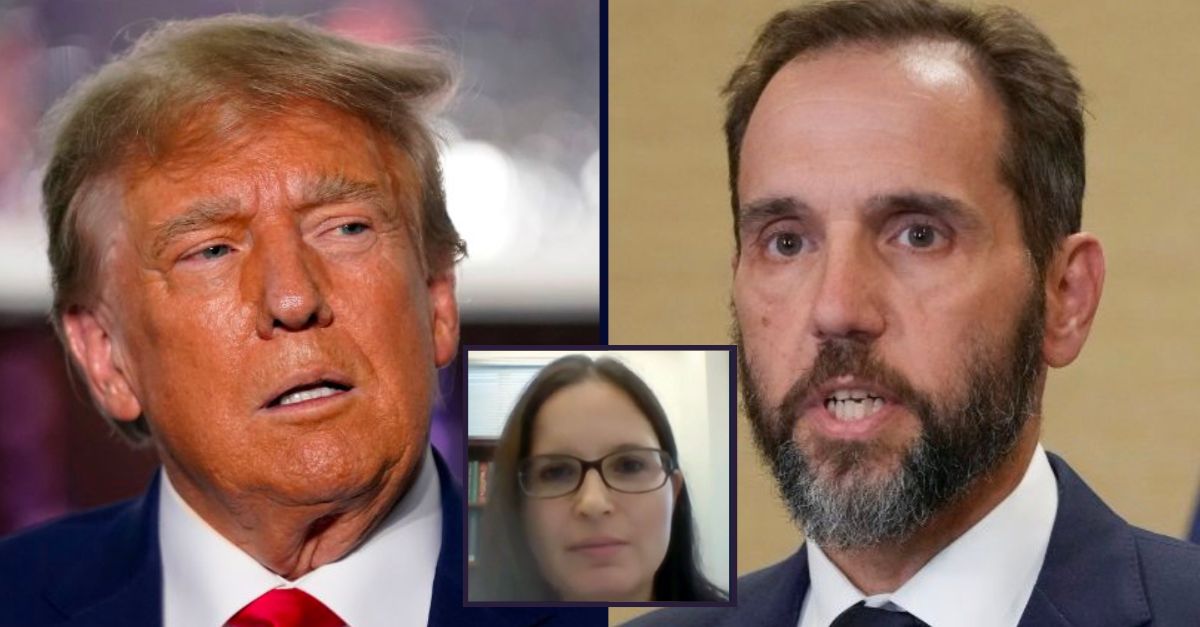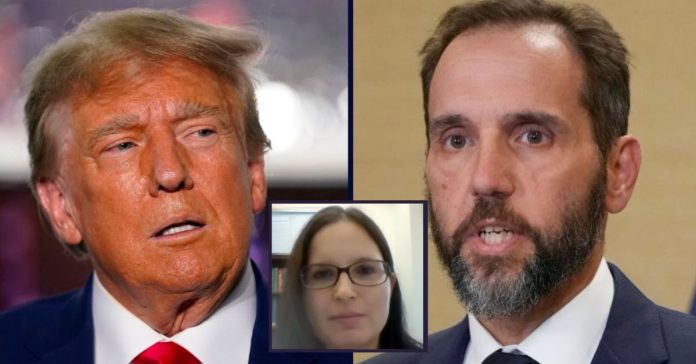
Left: FILE — Former President Donald Trump speaks at Trump National Golf Club in Bedminster, N.J., June 13, 2023, after pleading not guilty in a Miami courtroom earlier in the day to mishandling classified documents. (AP Photo/Andrew Harnik, File). Right: Special counsel Jack Smith speaks about an indictment of former President Donald Trump on Aug. 1, 2023, at a Department of Justice office in Washington. (AP Photo/Jacquelyn Martin). Inset: In this image from a video provided by the U.S. Senate, Aileen M. Cannon speaks remotely during a Senate Judiciary Committee oversight nomination hearing to be U.S. District Court for the Southern District of Florida on July 29, 2020, in Washington.
The prosecutor appointed to oversee the federal government’s prosecution of Donald Trump over the former president’s allegedly wrongful retention of documents inside his resort home in Florida is once again imploring the presiding judge to stop Trump’s legal team from releasing unredacted discovery material which appears to be aimed at exposing the identities of potential government witnesses.
As previously reported by Law&Crime, Judge Aileen Cannon — whom Trump appointed to the bench — earlier this month rejected a request from special counsel Jack Smith to keep the government’s redactions in place on certain filings. Cannon reasoned that Smith failed to set forth a sufficient “factual or legal basis” that would warrant deviating from “the strongest presumption in favor of public access” to such documents.
The majority of Smith’s proposed redactions concerned “sealing the identity of potential Government witnesses and their statements,” and in support of that, Smith “refers in general terms to witness safety and intimidation,” Cannon wrote in the Feb. 6 order denying the special prosecutor’s request.
“Although substantiated witness safety and intimidation concerns can form a valid basis for overriding the strong presumption in favor of public access, the Special Counsel’s sparse and undifferentiated Response fails to provide the Court with the necessary factual basis to justify sealing,” the judge wrote.
In his latest filing, Smith argues that Trump’s legal team on Thursday filed documents with the court that were “inconsistent” with the process they proposed and to which the court agreed and asked that Cannon deny Trump’s request to disclose certain discovery material, claiming that “doing so would unnecessarily expose potential witnesses to very real dangers of harassment, intimidation, and reprisal.”
Smith argues that many of the unredacted documents Trump and his co-defendants, Waltine Nauta and Carlos De Oliveira, seek to make public are irrelevant to the Trump legal team’s filing.
“First, the defendants seek to publicly disclose the entirety of a search warrant application for defendant Carlos De Oliveira’s Gmail account. As represented to the Government in the conferral process, there is a single paragraph of the search warrant application that is of interest to the defendants for purposes of their reply supplement,” Smith wrote. “Instead, as was true with several of the exhibits they attached in support of their motion to compel, the defendants have gratuitously sought to publicize the entire search warrant application despite their asserted extremely narrow evidentiary need for it.”
According to Smith, there is no reason to publicize the warrant in its entirety other than to identify and thereby jeopardize the safety of potential government witnesses.
Trump is also seeking the release of five pages of a Secret Service agent’s grand jury testimony transcript, which centers on discussions of potential government witnesses, the filing said.
It was not immediately clear when Cannon would rule on Smith’s latest filing.
Have a tip we should know? [email protected]

